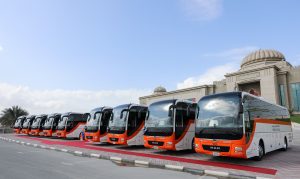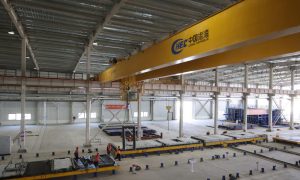MAN Truck & Bus celebrates a century
A look at the company’s past, present and plans for the future

Few companies can claim to have been in the commercial vehicle manufacturing business for as long as MAN Truck & Bus has. As the German brand marks a century since its first truck rolled off the production line in 1915, it’s worth examining its history and contributions to the field thus far and plans for the years to come.
“We were one of the early ones to make trucks and buses, and we’re one of the few who still make trucks and buses,” says Franz Freiherr von Redwitz, managing director of MAN Truck & Bus Middle East. “The industrial group is now 257 years old, but the commercial vehicle business started a hundred years ago. Many companies have been born and have grown over time in the commercial vehicle industry, but we belong to the early ones.”
MAN’s history of commercial vehicle manufacturing in Germany can be traced all the way to June 21, 1915 when a new company entered the trade register of the city of Nuremberg: Lastwagenwerke M.A.N.-Saurer. The company was established as a joint venture between Maschinenfabrik Augsburg-Nürnberg AG and Saurer, a Swiss producer of commercial vehicles.
The first MAN-Saurer 3-tonne truck soon left the joint factory in Lindau at Lake Constance, and it was followed by the first buses, which were used as long-distance buses by the Imperial Post Office and transported passengers as well as letters and parcels.
“The first engines we used were petrol engines,” von Redwitz points out. “Diesel engines came to commercial vehicles only in the 1920s.”
While diesel engines were around, they were too heavy for use in vehicles at first. In 1924, MAN introduced the first truck with a direct-injection diesel engine, paving the way for the use of diesel engines in truck construction. This saved up to 75% of operating costs in comparison with the petrol engines common at the time.
In the same year, MAN produced the first low-floor bus with a specially designed low-frame chassis. The buses that MAN had previously built since 1915 had run on truck chassis.
Decades later, at the end of the 1970s, MAN entered into cooperation with Volkswagen in the light truck segment. The 6t and 8t trucks of the G-series were jointly produced until 1993.
While milestones in the company’s manufacturing history are by and large well documented, its story in the Middle East is less so, von Redwitz admits. “That part of our history is a little bit in the dark. We don’t have clear records on that, unfortunately.”
“The main reason is that at the end of World War II in 1945, we lost a lot of documents because our facilities were making military goods at the time and thus the target of the Royal Air Force and the American Air Force. Therefore, as our industrial plants were destroyed at the end of World War II, a lot of documents have been lost.”
However, the brand’s presence in the Middle East and Indian subcontinent goes back a long time, with some vehicles in Pakistan from as far back as the 1940s. “We’re currently looking for the oldest truck in the region that is still operating, and we found one in Damascus that is a 1951 model produced just after World War II, and is still in daily operation in Syria.”
MAN’s relations with importers in the GCC also go back a long way, and the company is marking thirty years of partnership this year with Haji Husein Alireza, its dealer in Saudi Arabia. “It’s a very long-term successful partnership. We started thirty years ago with nothing, and now we’re number two in the market.”
In Oman too, MAN has had a long partnership with its importer. Its presence began in 1981 with AES, a part of Saud Bahwan Group. “There, we are market leaders. Business is booming in Oman, and we are the leaders of the commercial vehicle market there.”
Safety and sustainability
With a firmly established presence in the GCC and wider Middle East, what are the plans for the region going forwards? A key area of focus will be lobbying for better road safety standards and load regulations as part of a wider road safety campaign, von Redwitz says.
Pushing for tougher standards for heavy trucks and fleet operators can not only potentially save lives, it can also help governments save on long-term costs, such as the cost of damage to infrastructure when overloaded trucks ply the roads.
“Governments now realise that the more load you have on one axle, the more it damages the roads. It’s not just a question of the destruction of infrastructure, it’s also really a question of the safety of the vehicle,” he says, pointing out that even a truck engineered to top-notch safety standards becomes unsafe when constantly subjected to overloading.
“But this is only one part of our road safety campaign. We also strongly lobby for regulations on the time a driver is allowed to drive without taking a break. That is something enforced electronically in Europe.”
Sustainability will also continue to be a core area of focus for the German manufacturer, which recently announced its listing in the Dow Jones Sustainability Indices for the third time in a row. MAN was the only German company to be represented in its sector, Machinery and Electrical Equipment, and improved in all three main categories – economic, environmental and social matters.
Fuel efficiency and sustainability remain a current driver of product development as fuel resources worldwide continue to decline, and various alternative drive concepts are in the works for the manufacturer. At last year’s IAA fair, MAN introduced the TGX Hybrid, a concept vehicle for a TCO-optimised truck hybrid drive that might be used in long-distance transport. It has also built the Metropolis research vehicle, a fully electrically operated heavy truck with a range extender for tasks in the city. It is currently in the test phase.
Even with the low fuel costs in the GCC, von Redwitz expects increased interest in efficiency over the coming years, something that might gain traction in the UAE, with the current deregulation of fuel prices. “The issue of fuel consumption will play a bigger role in the operating costs of our customers. The less subsidies there are on fuel, the higher the fuel costs will be.”
Fuel consumption will thus play an even more critical role in influencing a customer’s decision over which vehicle to purchase, he points out. “At the moment, diesel has become cheaper, but this is only the beginning. If the fuel price rises, the selection of an efficient vehicle becomes even more important than it is now.”
In line with the increased focus on fuel efficiency and safety, MAN will also be launching telematics systems this year, enabling fleet operators to keep better tabs on consumption and monitor vehicles and driver behaviour more effectively.
While MAN’s dominance in the heavy truck segment is well established, does the manufacturer have any plans to venture into LCVs in the future?
“We are an 8.5t-up company. That’s where we have our base. However, there are thoughts in development in those fields, but nothing concrete yet,” von Redwitz says.
Although the German manufacturer has constantly been reinventing itself, it does not see LCVs as a financially viable segment. “Light- and medium-duty vehicles are quite difficult to earn money from. It’s a very big market with very tight margins, and there we have strong players. We are therefore very cautious in what we do and where we put our development money. There are things on the way, but nothing to be presented or communicated currently.”

























